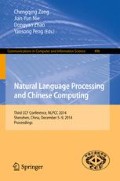Abstract
To identify the cause of emotion is a new challenge for researchers in nature language processing. Currently, there is no existing works on emotion cause detection from Chinese micro-blogging (Weibo) text. In this study, an emotion cause annotated corpus is firstly designed and developed through annotating the emotion cause expressions in Chinese Weibo Text. Up to now, an emotion cause annotated corpus which consists of the annotations for 1,333 Chinese Weibo is constructed. Based on the observations on this corpus, the characteristics of emotion cause expression are identified. Accordingly, a rule-based emotion cause detection method is developed which uses 25 manually complied rules. Furthermore, two machine learning based cause detection methods are developed including a classification-based method using support vector machines and a sequence labeling based method using conditional random fields model. It is the largest available resources in this research area. The experimental results show that the rule-based method achieves 68.30% accuracy rate. Furthermore, the method based on conditional random fields model achieved 77.57% accuracy which is 37.45% higher than the reference baseline method. These results show the effectiveness of our proposed emotion cause detection method.
Access this chapter
Tax calculation will be finalised at checkout
Purchases are for personal use only
Preview
Unable to display preview. Download preview PDF.
References
Mohammad, S.: From Once Upon a Time to Happily Ever After: Tracking Emotions in Novels and Fairy Tales. In: Proceedings of the 5th ACL-HLT Workshop on Language Technology for Cultural Heritage, Social Sciences, and Humanities, pp. 105–114 (2011)
Purver, M., Battersby, S.: Experimenting with Distant Supervision for Emotion Classification. In: Proceedings of the 13th Conference of the EACL, pp. 482–491 (2012)
Panasenko, N., Trnka, A., Petranova, D., Magal, S.: Bilingual analysis of LOVE and HATRED emotional markers. In: Proceedings of the 3rd SAAIP workshop, IJCNLP 2013, Japan, pp. 15–23 (2013)
Vaassen, F., Daelemans, W.: Automatic Emotion Classification for Interpersonal Communication. In: Proceedings of the 2nd Workshop on Computational Approaches to Subjectivity and Sentiment Analysis (2011)
Tang, D., Qin, B., Liu, T., Li, Z.: Learning sentence representation for emotion classification on microblogs. In: Zhou, G., Li, J., Zhao, D., Feng, Y. (eds.) NLPCC 2013. CCIS, vol. 400, pp. 212–223. Springer, Heidelberg (2013)
Xu, R., Ye, L., Xu, J.: Reader’s Emotion Prediction Based on Weighted Latent Dirichlet Allocation and Multi-Label k-Nearest Neighbor Model. Journal of Computational Information Systems 9(6) (2013)
Yao, Y., Xu, R., Lu, Q., Liu, B., Xu, J., Zou, C., Yuan, L., Wang, S., Yao, L., He, Z.: Reader emotion prediction using concept and concept sequence features in news headlines. In: Gelbukh, A. (ed.) CICLing 2014, Part II. LNCS, vol. 8404, pp. 73–84. Springer, Heidelberg (2014)
Xu, R., Zou, C., Xu, J.: Reader’s Emotion Prediction Based on Partitioned Latent Dirichlet Allocation Model. In: Proceedings of of International Conference on Internet Computing and Big Data (2013)
Ye, L., Xu, R., Xu, J.: Emotion Prediction of News Articles from Reader’s Perspective based on Multi-label Classification. In: Proceedings of IEEE International Workshop on Web Information Processing, pp. 2019–2024 (2012)
Lee, S.Y.M., Chen, Y., Li, S., Huang, C.-R.: Emotion Cause Events: Corpus Construction and Analysis. In: Proceedings of International Conference on Language Resources and Evaluation (2010)
Chen, Y., Lee, S., Li, S., et al.: Emotion Cause Detection with Linguistic Constructions. In: Proceeding of International Conference on Computational Linguistics (2010)
Lee, S., Chen, Y., Huang, C., et al.: Detecting Emotion Causes with a Linguistic Rule-based Approach. In: Computational Intelligence (2012)
Das, D., Bandyopadhyay, S.: Analyzing Emotional Statements – Roles of General and Physiological Variables. In: Proceedings of IJCNLP (2011)
Myers, G.D.: Theories of Emotion. Psychology: Seventh Edition, p. 500. Worth Publishers, New York
Author information
Authors and Affiliations
Editor information
Editors and Affiliations
Rights and permissions
Copyright information
© 2014 Springer-Verlag Berlin Heidelberg
About this paper
Cite this paper
Gui, L., Yuan, L., Xu, R., Liu, B., Lu, Q., Zhou, Y. (2014). Emotion Cause Detection with Linguistic Construction in Chinese Weibo Text. In: Zong, C., Nie, JY., Zhao, D., Feng, Y. (eds) Natural Language Processing and Chinese Computing. NLPCC 2014. Communications in Computer and Information Science, vol 496. Springer, Berlin, Heidelberg. https://doi.org/10.1007/978-3-662-45924-9_42
Download citation
DOI: https://doi.org/10.1007/978-3-662-45924-9_42
Publisher Name: Springer, Berlin, Heidelberg
Print ISBN: 978-3-662-45923-2
Online ISBN: 978-3-662-45924-9
eBook Packages: Computer ScienceComputer Science (R0)

